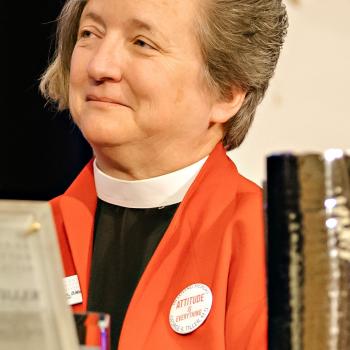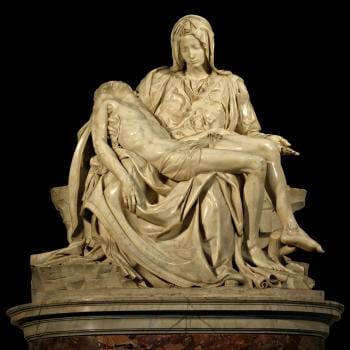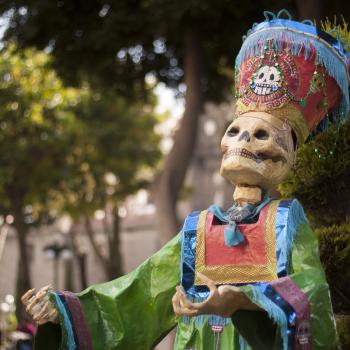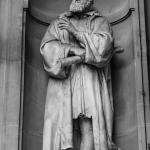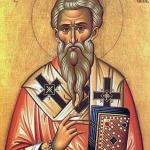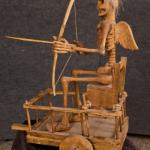A friend of mine told me a miracle story last evening. He was driving along the road in the right lane. Two cars were beside him in the left lane. The road was in a suburban area. Ahead on the right he spotted a mother walking a dog coming in the direction facing him. Beside her was a young child jumping and playing. As he approached them, with the two cars still in the left lane beside him, the child suddenly jumped from the sidewalk directly into his path. He swerved left to avoid the child, knowing that he would collide with both cars to his left. He realized instantly that he would probably be injured or killed. He successfully avoided the child, but there were no cars to his left. They had disappeared. He swerved back into his lane and a few hundred yards further stopped at a traffic light. The two cars that had been at his side, were at his side again and pulled up and stopped just as he did.
My friend is by no means a credulous person who is prone to see the face of Mother Teresa in a bagel or have visions of St Etheldreda in the night. He is level headed and while a believer, is prone to dismiss such things as flights of fancy. He was non plussed and spent most of the evening searching for a rational explanation. He failed.
So what happened? A conventionally religious person would say, “The guardian angels prevented this accident from happening! Praise the Lord!” I’m good with that. A New Age prognosticator might say something like, “In any one place the good vibrations of people who live well generate positive dynamic synergies which work together to sometimes produce extraordinary suspensions of the usual laws of physics, and this is what we call a miracle.” Whatever.
What interests me more is the possibility of miracles, and how we understand them in the modern world. The materialist would simply dismiss my friend’s story saying such things are impossible. This is David Hume’s not so clever argument: “Miracles are impossible therefore miracles do not happen.” This is based on a closed understanding of the laws of nature. For the materialists the laws of nature are set in stone. Things happen certain ways and they can never be changed. The trains of the natural order always stay on their rails and they always run on time.
Human experience tells us otherwise. Inexplicable things happen. We don’t have all the explanations. Scientists have made amazing discoveries, but rather than getting all the answers, their research usually also unlocks how much more there is to discover, and one of the things they are discovering is that the natural order is not quite so firm and unchangeable as we first thought. There is a dynamic and unpredictable element to the natural world. Reality is rubbery. There is an open ended quality to our experience.
This is where myth and magic come in. First we should get our terms straight. When I say “magic” I am not concerned with conjuring tricks and slight of hand and making cards disappear. I’m talking about those who take magic seriously and wish to manipulate reality through the use of supernatural powers. People who are into the occult, witchcraft, shamanism, voodoo, spiritual healing, spiritism, fortune telling etc. This enterprise is what I call “magic” and magic is different from miracles. A miracle is a suspension of the laws of nature by some un-defined power and in some unspecified manner which we experience, but do not ourselves produce. Magic is the attempt by the magician to control these powers or take on these powers for his own ends.
Therefore, you might say that a Christian minister who lays hands on someone and prays for healing is doing magic. You might say that a Catholic priest who extends his hands and prays that the bread and wine are transformed into the body and blood of Christ is doing magic. Not quite. In both cases the action is God’s. The minister is simply co-operating with God’s power and allowing God to do as he wills. Instead of claiming power for himself he is yielding his will and power to God.
I realize that for the unbeliever all of this is the stuff of myths, fantasy and fairy tales–and that it is simply untrue, and by “untrue” he means not scientific. Again, we should clarify our terms. The word “myth” is often used to mean “an untrue story” or “a story with magical elements”. In fact “myth” has a deeper meaning. Myth connects us with archetypes of character and action which resonate within the greater consciousness of the whole race. A myth proper is a kind of universal human story which functions on a powerful symbolic level. It does not propose to be a historical story. A myth is therefore un-historical, but it is not un-true.
What shall we make then, of the stories of the Bible–especially the Old Testament? What do we make of the miraculous elements like Jonah being swallowed by the whale, Elijah being caught up to heaven in the fiery whirlwind, the manna in the wilderness etc? In the Old Testament we actually see something fairly unique in the development of religion: stories with a miraculous and mythic dimension which are also presented as historical.
The Old Testament is rooted in history. The stories are presented as really happening. We can allow that they may have been expanded and exaggerated over the years, but like legends (which are extravagant stories based in real events) they are rooted in historical reality. How can this be?
I’m back now to the rubbery nature of reality. We’re presented in the Christian scriptures with some stories of extraordinary events–events that cut across our usual expectations of how the natural order works. We’re confronted with miracles. They make us gasp and wonder–with a natural mixture of disbelief and confusion. That’s okay. Miracles were supposed to upset our smug little close minded ideas of how the universe works.
The materialist will dismiss them and say, “Miracles are impossible. Therefore miracles don’t happen.” This is an expression of scientism–the belief that the only valid knowledge is scientifically proven knowledge. But science itself is revealing that the natural order is more mysterious and open ended than we might like. The materialist must ignore the experience of the vast majority of human beings of all races and in every place and every time for people everywhere have understood that there is such a thing as the miraculous, that strange things do happen, and that our materialist explanations do not explain everything. The vast majority of human experience–of human culture and human awareness is imbued in some way or other with the sense that there is more to life than our simple senses can perceive or explain. Are we to write off the vast majority of the human experience down the ages as “silly superstition”? This is not only arrogant. Even worse: it is dull.
At the end of this week we will face once again the most stupendous miracle of all–that Christ Jesus rose from the dead. Materialists–who often pride themselves on being open minded–rarely stop to consider the evidence. If they would, their world would be turned upside down.
But maybe that’s why they won’t.






